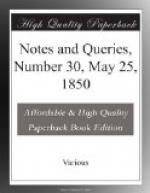And temp. Edward II 1324,—
“Un hanap a pee de la
veille fazon quillere et cymelle el founz
du pois xxix, du pris xl.”
In the same document several others are described having feet. I could give many other quotations, but will conclude with only one more, as in the last occurs the word kyrymyry, of which I should like to know the derivation, if any of your readers can assist me:—
“Item, un hanap d ore
covere del ovrage d un kyrymyry et iij
scochons des armes d Engleterre
et de Franuce en le sumet.”
I have met with notices of cups “covered of kerimery work,” and “chacez et pounsonez en lez founcez faitz de kermery;” and the following, from the Vision of Piers Ploughman, would seem to indicate a sort of veil or net-work:—
“He was as pale as a pelet,
In the palsy he semed
And clothed in a kaurymaury,
I kouthe it nought diseryve.”
W.C.
Jun.
* * * * *
MISCELLANIES
Bishop Burnet as an Historian.—Dr. Joseph Warton told my father that “Old Lord Barthurst,” Pope’s friend, had cautioned him against relying implicitly on all Burnet’s statements; observing that the good bishop was so given to gossiping and anecdote hunting, that the wags about court used often to tell him idle tales, for the mischievous pleasure of seeing him make note on them. Lord Bathurst did not, I believe, charge Burnet with deliberate misrepresentation, but considered some of his presumed facts questionable, for the reason stated.
ELIJAH WARING.
Dance Thumbkin.—In the Book of Nursery Rhymes, published by the Percy Society, there is a small error of importance, involving no less that the learned would call “a non sequitur,” and which, if my correct-and-almost-unequalled nurse, Betty Richins, was alive, she would have noticed much sooner that the nurseling who now addresses you. (She died about the year 1796.) In the valuable and still popular nursery classical song, “Dance Thumbkin, dance,” it is not only an error to say “Thumbkin he can dance alone” (let any one reader of the “NOTES AND QUERIES,” male or female, only try), but it is not the correct text. Betty Richins has “borne me on her knee a hundred times” and sung it thus:—
Thumbkin cannot dance alone.
So[1] dance ye merry men, every one.”
I scarcely need add, that if this be true of Thumbkin, it is truer of Foreman, Longman, Middleman, and Littleman.
R.S.S.
[Footnote 1: Or then, meaning “for that reason.”]
King’s Coffee-house, Covent Garden.—As an addition to “Mr. RIMBAULT’s” Notes on Cunningham’s Handbook, the following extract from Harwood’s Alumni Etonenses, p. 293., in the recount of the boys elected for Eton to King’s College may be interesting:—




